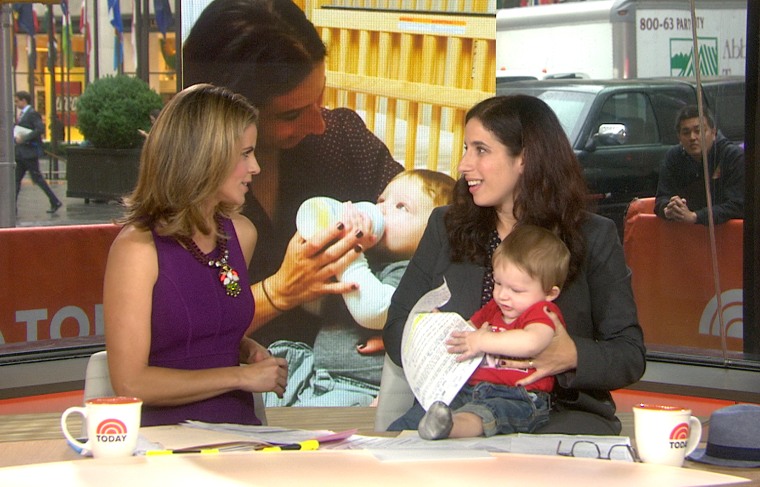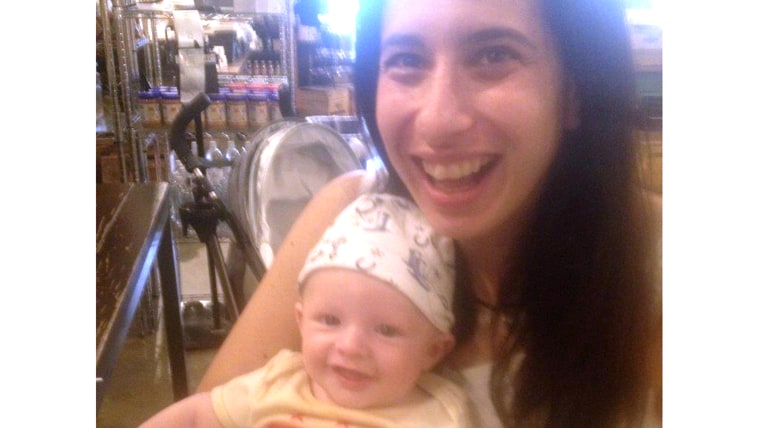For new mother Emily Wax-Thibodeaux, the decision not to breast-feed was simple: After breast cancer and a double mastectomy, she can't.
Nine months after her son Lincoln was born, she's still stunned by the pressure and judgment she faced from friends, strangers and even the lactation consultants at the hospital. Wax-Thibodeaux, a national reporter for The Washington Post, wrote about her experience with formula feeding in an essay that has gone viral, illuminating a darker side of the pro-breastfeeding movement.
In her essay, titled "Why I don't breastfeed, if you must know," Wax-Thibodeaux described how the blissful moment of watching her husband feed their newborn in the hospital after she gave birth was ruined when lactation consultants descended on the family’s hospital room to suggest breast-feeding as a better option.

When Wax-Thibodeaux explained that she is a breast cancer survivor who is unable to breast-feed, they still insisted.
“Just try,” one advised. “Let’s hope you get some milk.”
“It may come out anyway, through your armpits,” another said.
Diagnosed with breast cancer at age 32, Wax-Thibodeaux had a double mastectomy followed by chemotherapy and reconstruction. In the eight months since having Lincoln, Wax-Thibodeaux continues to get “the question” from moms she meets, whether at yoga class or at the park or even from friends: “So you’re not breast-feeding? It’s better, you know.”
Wax-Thibodeaux, now 40, says she wrote the story to point out that breastfeeding is not the only way to bond with your baby. “A lot of the breast-feeding literature says you will be closer, have a better bond. But I can’t imagine feeling closer to Lincoln,” she told TODAY.com.

“There is a feeling that you are a more superior mother if you can breast-feed,” Wax-Thibodeaux said. “But motherhood is about so much more.”
In addition to other breast cancer survivors, Wax-Thibodeaux said, people who responded to her story included moms who had different reasons for not breastfeeding. Some had serious problems, such as babies with cleft palates or women with chronic kidney disease. She also heard from moms who just didn’t want to breast-feed, or found it difficult, or wanted to share feeding responsibilities with their husbands.
“A lot of the emails felt like confessionals, people who felt like they couldn’t talk about it because it was stigmatized,” says Wax-Thibodeaux, who wished she could have told people who judged her about formula feeding to “back off.”
The essay also touched new moms who felt they were being judged for other things, like their decisions for or against natural childbirth.
"It really struck people beyond the cancer survivor community as being important," she said Thursday on TODAY.
Several surveys conducted on TODAY.com found Wax-Thibodeaux wasn’t alone — that a majority of women who did not breast-feed their babies also felt judged poorly by society.
Jennifer Hartstein, a clinical psychologist, said that has to do with the need by most humans to compare themselves to others.
“We’re constantly in that mode, and oftentimes, we’re looking and judging, ‘Am I doing as well?’ So it’s our own insecurities that we’re putting out on other people , which comes back to us, and it’s awful," she said on TODAY. "If we could just lift each other up, how much better it would be."
Comments on Wax-Thibodeaux's story were mostly reassuring. One woman, a self-described “militant (haha) 1990s breastfeeder (anywhere, anytime),” congratulated Wax-Thibodeaux on her cancer recovery and her baby, and said, “So you got the two important things covered. Anything else is just background noise. You can support breast-feeders and/or bottle-feeders … with more information, if you want, or not. Either way is fine.”
Another responded: “I remember the era in which women who breast-fed were castigated. Now the vituperation is aimed at women who feed formula to their infants. My view of feminism and common sense is that one size does not fit all. Let each mother decide what is best for her and her baby.”
Other parents wondered why formula-feeders, in general, even need to defend their stance.
Jennifer Adams wrote on Facebook: “The breast/formula wars are a good example of mind your own business; but my question is, why do you (general you) even care what other people think of your decisions? I breast-fed both of my children and had to supplement the second child with formula, and I never considered anyone's opinion but my own; not my husband's, not my friends', just me and the baby — he needed to eat, I didn't have enough milk, voila = formula. No biggie!”
Follow Kavita Varma-White on Twitter.